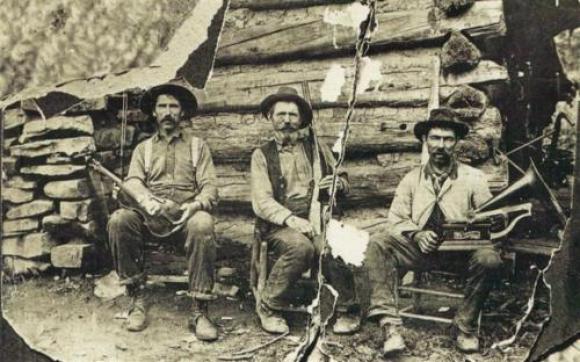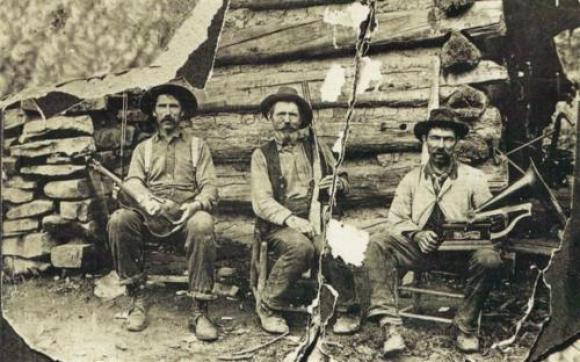
Southerners love home. This is true of many people throughout history, but place has, in part, defined the South. The earliest settlers to what became the South championed its Utopian physical qualities: warm weather, a long growing season, bountiful plant and animal life. Bad weather, disease carrying insects, and dangerous wildlife were annoyances to be tolerated if not overcome.
Southern culture easily developed in this environment. A worldview in which “heaven” could be perceived on earth allowed the Southerner to find contentment. People, place, and community–a defense of hearth and home–became quintessential Southern traits and an important part of the richness of Southern art. Southern literature is popular because Southern culture is unique and tangible, a thing to be savored not endured. When the break with the Union occurred in 1861, the Southerner easily rallied around his State because the “state” was representative of his people. He fought not for the glory of a “national” entity, but for the protection of his way of life, a way of life threatened by a foreign “other.” They were both “American,” but to the Southerner, their “America” was nothing like the “America” of the North, and no Southerner wished to be “Americanized” by a people with an alien culture and traditions.
They both spoke of the founding generation, of the founding “principles” of the United States, and to each “Union” and “liberty” were concepts best described by their own communities. To the North, “Union” offered a the freedom of fear and want, an almost messianic devotion to a territorial boundary that could not be abridged or truncated. Southerners used the same language as did the founding generation. Theirs was a commitment to the “ancient constitutions” of their fathers. Patrick Henry would have agreed.
Musicians wove this love of place into music, and by the time recorded music became an integral part of the twentieth century culture, there were more popular songs about Dixie and the South than any other place in the world. All of the fifteen Southern States of 1860 have a song or two written about them, and all fall under two categories: affirmation or defiance. Each song below represents a Southern State and a defiance or affirmation theme. I discussed this in length during our 2018 Summer School on Southern music. The South’s four hundred year history is a unique component of the American experience. I have often said the South is America. Both black and white Southerners have created a musical tapestry that explains an affection for place surpassed by very few other cultures or regions in the world.
Missouri: This tune by the virtually unknown 1970s rock group Mama’s Pride is a bluesy groove that highlights the very real problem with swindlers in Southern society. Southerners didn’t trust Bill Clinton because every Southerner knew a Bill Clinton.
Maryland: There are few Southern songs of defiance like Maryland, My Maryland, and before it was “racist” to admire this tune, black musicians performed it across the South as a jazz standard. I wonder if that makes them “racist?”
Florida: Songs about the South and Southern States became chic in the 1970s. Florida band Molly Hatchet capitalized on the trend by writing one of the best pro-Southern anthems of the period, Gator Country. Plus, you have to love Danny Joe Brown’s official Billy Carter “Redneck Power” shirt. This song sounds as good live as it does on the album.
The Carolinas: There are so many tunes celebrate the Carolinas, and Carolina born Charlie Daniels has one of the best, but the two below are representative of two other Carolina born artists, the Marshall Tucker Band and Josh Turner. Marshall Tucker rode the Southern music renaissance wave in the 1970s and Blue Ridge Mountain Skies has a perfect lyric, “Carolina is where I’m at, and I’ll always hang my hat, under those blue ridge mountain skies.” John Turner’s bass vocals are perfect in his homage to South Carolina and the double meaning of “low country.”
Kentucky: A bluegrass choice perhaps would have made the most sense for the place where the genre was born, but Darrell Scott’s You’ll Never Leave Harlan Alive is a haunting song of affirmation, defiance, and despair. If runs the gamut of emotions, and if you can make it through the song without choking up a bit, you’re not alive.
Alabama: This song had to be here. It is by far the most important Southern anthem of the twentieth century, and next to Dixie the most recognized Southern song. Plus, it’s politically incorrect to love it in 2019. Just tell that to the millions of people who still “turn it up.”
Tennessee: Daniels could have made the list for a few other States, but this little tune written and sung by CDB member Tommy Crain is the best song written about the State in my opinion. “We got all we need, We got Tennessee.”
Georgia: I considered Jamey Johnson’s Macon or Charlie Daniels’s Georgia for the list, but Ray Charles’s version of Georgia On My Mind is just a beautiful affirmation of the State and region.
Mississippi: The band Train has a hauntingly stunning tune titled Mississippi that would be perfect as an affirmation of the State and region, but I decided to go with Whiskey Myers’s Mud as the perfect defiance song for the State and it’s muddy waters and riverbanks.
Texas: A State with a musical catalog and even bigger persona, there is no better expression of Southern defiance (and by default affirmation) than this song. “Screw You, We’re From Texas.”
Louisiana: A jazz tune would have been a logical choice for the home of Dixieland music, but this little tune by The Band of Heathens has just the right amount of Southern defiance and affirmation. The Yankees tell them how to “fix” and problem and the old man just smiles and says, “I’ve been through this before.”
Virginia: Singing songs that would make the modern PC police go nuts was a hallmark of the 1950s. This little tune by Jerry Lee Lewis is no exception.
Arkansas: Jimmy McCracklin was a leading figure in the growth of R&B music, but he was a proud Arkansan who wrote this tune as an affirmation of his home State.
Delaware: Delaware is not often considered a Southern State, and it isn’t today, but South Carolina included the State on its secession banner in 1860, and the people in the rural parts of the State are certainly more Southern than Northern in their habits and culture. This is a more modern tune that pokes at the State’s geographic size but that also shows a love for place.






